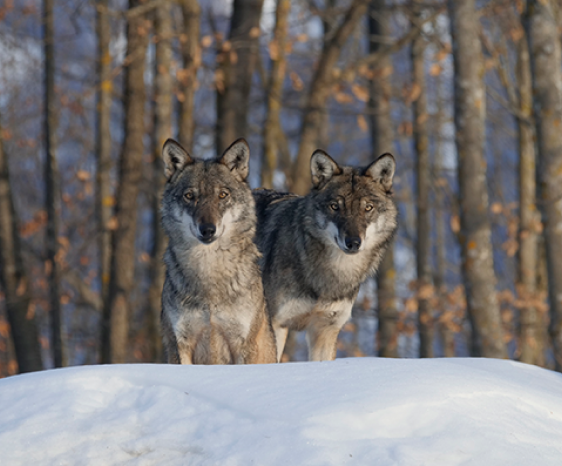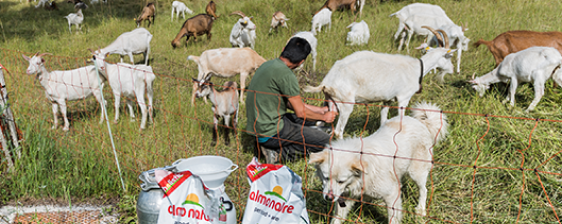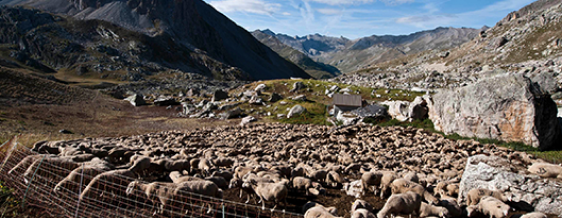Life Wolfalps EU
Critical Issues
Continuous persecution led to the extinction of the wolf in the Italian Alps at the beginning of the 20th century.
Only in 1977 were these practices made illegal, and in the Western Alps, since the 1990s there has been a slow recovery of the species with a positive trend: here in 1996-97 the first cross-border herds between Italy and France were documented.
The Italian Alpine area is important as a place of reunion between the Italian Apennine wolf population and that of the Dinaric Alps. The interactions between the presence of the wolf and farming activities have always been the source of conflicts: it is of fundamental importance to invest locally in systems for preventing attacks on livestock and to support the work of farmers to promote coexistence between wolves and human activities.
Area of Intervention
The project involved the entire Alpine ecosystem, both where the wolf has been present for over twenty years (Western Alps) and where the recolonization process is at the beginning (Central and Eastern Alps), in 4 of the 7 Alpine countries: Italy , France, Austria and Slovenia. It also intervenes in the Ligurian-Piedmontese Apennines area, a fundamental ecological corridor for the Alpine wolf population.
The project area in Italy included the entire Alpine territory: a vast area of approximately 1,200 km in length, with a surface area of around 51,941 km2, equal to approximately 27% of the total surface area of the Alps. The area of project in Italy extends within the borders of seven regions, whose mountain component varies from 100% in the Aosta Valley to 29% in the Veneto. Furthermore, in the western part of the area, given the recent expansion of the species also in the hill and plain areas, the project also involved the entire Ligurian-Piedmont regional territory.
Intervention
Life WolfAlps EU was a European project that fell within the scope of the LIFE 2018 "Nature and biodiversity" programming. It had the long-term objective of improving coexistence between man and wolves in the Alpine arc (mitigating conflict), through coordinated actions in Italy, France, Austria and Slovenia to reduce the impact of the species on breeding, establish a balance between the world of hunting and the presence of predators, combat poaching and disseminate correct information based on scientific data. Fondazione Capellino intervened as the first financier, after the European Union, with a budget of €600,000:
www.lifewolfalps.eu/cofinanziatori/
Furthermore, an additional agreement between Life and Almo Nature also envisaged the supply of kibble for the anti-poison dogs operating in the Alps. Discover More
Some of the activities of the project, to which Fondazione Capellino allocated its contribution, were:
- Measures against poaching and for the control of poisoned bait
- Mitigation of human-wolf conflict in hotspot areas through emergency teams for the prevention of predation in mountain pastures: damage assessment, prevention systems, mediation, wolf control
- Reduction of habitat fragmentation and mortality caused by vehicular traffic through the recovery of particularly problematic areas (sink areas)
- Monitoring of the status of the wolf population at Alpine level
- Control of wolf-dog hybridisation and recovery of injured wolves: identification and control in the Apennine ecological corridor and in the Alps
- Active involvement of new generations and education/awareness of tourists and the community in the conservation of the species
From this address you can download the Layman's Report, with the results of the project.
Discover more:
www.lifewolfalps.eu/cofinanziatori/fondazione-capellino/
www.lifewolfalps.eu/



Our Partner
APAM-Protected Areas Alpi Marittime, Project Coordinator. It involves 20 entities in Italy, France, Austria and Slovenia. It is a European team working on the coexistence between wolves and human activities in the Alps, beyond national borders, of which APAM is the leader. The Alpi Marittime Protected Areas management body includes two parks and eight nature reserves. A vast and complex ecological network to be protected: the Maritime Alps Natural Park and the Marguareis Natural Park. A mosaic of territories, located in a large area that extends from the Alps to the plain and up to the Langa, involving 17 Municipalities.

Project data
 |
DURATION 5 years (01/09/2019 – 30/09/2024 - 3 already implemented) |
 |
OUR INVESTMENT €11,939,693.00 (of which €7 Million from the EU, and €600,000.00 from the Foundation Capellino) >3000/year meals for dogs Almo Nature |

